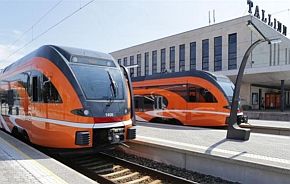Baltic States – CIS, Estonia, Railways, Tourism, Transport
International Internet Magazine. Baltic States news & analytics
Friday, 04.07.2025, 03:01
Train travel becomes more expensive in Estonia as transit contracts
 Print version
Print version |
|---|
In autumn the moment will arrive when the decision to raise ticket prices will have to be made. It also has to be decided whether to raise the prices in autumn or next year, said passenger train operator Elron board chairman Andrus Ossip. "In longer-term perspective it means that a train ticket will cost as much as a bus ticket does," he said.
Postimees said that the price increase could amount to 10-20%.
Elron, a third of whose expenditures go to infrastructure fees now, has operated diesel trains since the start of this year and says that it needs till autumn to analyze its financing principles. Ossip said though that for example the Tapa-Tartu and Tapa-Narva railway sections need to be renovated otherwise train speed will have to be reduced there.
"It is not possible for us to guess what happens when cargo transport decreases. It is important for us that trains ride and ride fast," said Ossip. "The increase in the number of passengers has to help cover the increasing costs – we count on 5.5 million and more passengers a year – or change of ticket prices. The correct way would be to use combined measures, where both ticket price and infrastructure subsidies would increase," he said.
While Elron, that promises fast train travel to Estonians, considers it possible to postpone the price increase, Eesti Raudtee (Estonian Railways Co) sees the situation in much bleaker colors.
"We have reached the level where we will have to start reducing the speed of passenger trains," admitted Eesti Raudtee Director General Ahti Asmann. "Our annual investment need is over 40 million euros and the company has just 25 million euros of finances to cover that need."
Raising the ticket price would be the solution and the state would have to pay additional subsides for railway infrastructure maintenance.
So far, the maximum sum for infrastructure repairs was taken from Russian transit transport but Asmann says that the volume of cargo transport has fallen by a fifth as compared to last year and cargo infrastructure tariffs cannot be raised any further either since they have been increased by nearly 50 percent in the past three years.
The Economy and Communications Ministry however has not considered changing ticket prices and hopes to allocate direct investment subsidies to Eesti Raudtee from EU finances, the ministry's adviser Rasmus Ruuda said.








 «The Baltic Course» Is Sold and Stays in Business!
«The Baltic Course» Is Sold and Stays in Business!

